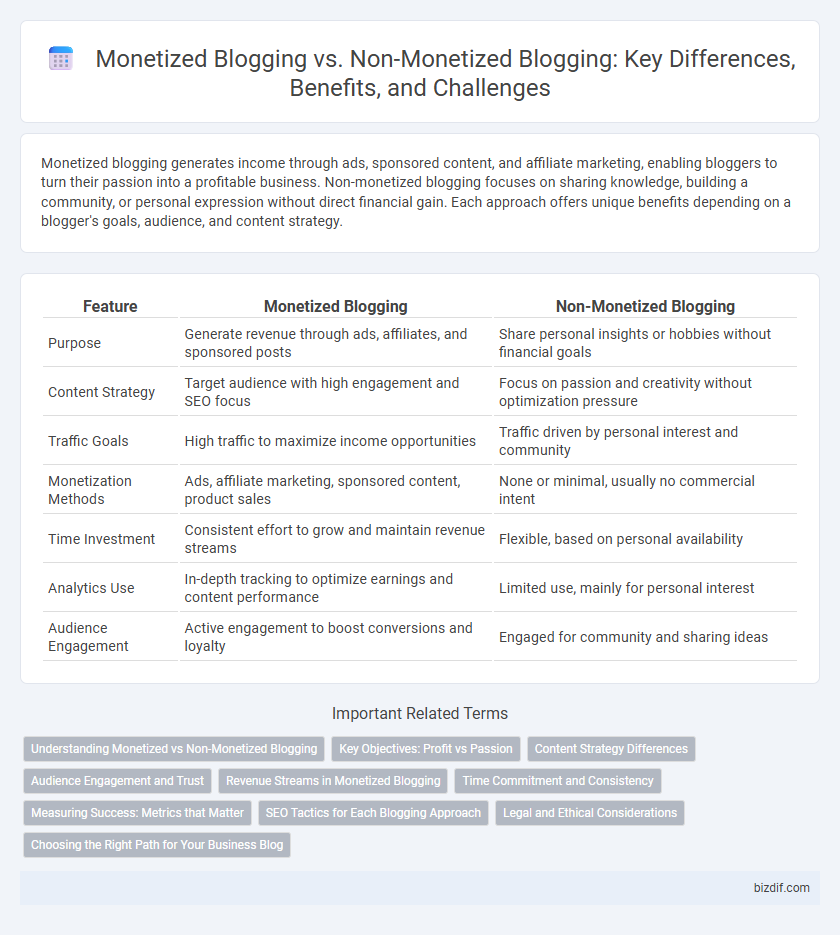Monetized blogging generates income through ads, sponsored content, and affiliate marketing, enabling bloggers to turn their passion into a profitable business. Non-monetized blogging focuses on sharing knowledge, building a community, or personal expression without direct financial gain. Each approach offers unique benefits depending on a blogger's goals, audience, and content strategy.
Table of Comparison
| Feature | Monetized Blogging | Non-Monetized Blogging |
|---|---|---|
| Purpose | Generate revenue through ads, affiliates, and sponsored posts | Share personal insights or hobbies without financial goals |
| Content Strategy | Target audience with high engagement and SEO focus | Focus on passion and creativity without optimization pressure |
| Traffic Goals | High traffic to maximize income opportunities | Traffic driven by personal interest and community |
| Monetization Methods | Ads, affiliate marketing, sponsored content, product sales | None or minimal, usually no commercial intent |
| Time Investment | Consistent effort to grow and maintain revenue streams | Flexible, based on personal availability |
| Analytics Use | In-depth tracking to optimize earnings and content performance | Limited use, mainly for personal interest |
| Audience Engagement | Active engagement to boost conversions and loyalty | Engaged for community and sharing ideas |
Understanding Monetized vs Non-Monetized Blogging
Monetized blogging involves generating revenue through advertisements, affiliate marketing, sponsored content, or selling products and services, which often requires strategic audience targeting and SEO optimization. Non-monetized blogging primarily focuses on sharing knowledge, personal experiences, or hobbies without direct financial gain, emphasizing authenticity and community engagement. Understanding the differences helps bloggers choose between prioritizing income generation or content passion, impacting their blogging approach and long-term goals.
Key Objectives: Profit vs Passion
Monetized blogging centers on generating revenue through strategies like affiliate marketing, sponsored content, and ad placements, prioritizing profit as the key objective. Non-monetized blogging emphasizes sharing knowledge, personal expression, or building a community without financial gain as the primary goal. Understanding the distinction between profit-driven and passion-driven blogging helps creators align their content strategy with their long-term vision and audience engagement goals.
Content Strategy Differences
Monetized blogging emphasizes content strategies focused on targeted keywords, affiliate marketing integration, and sponsored posts to maximize revenue and audience engagement. Non-monetized blogging prioritizes authentic storytelling, niche expertise, and community interaction to build trust and organic growth. Both approaches require consistent content quality, but monetized blogs often balance SEO optimization with promotional elements while non-monetized blogs concentrate on passion-driven topics and reader loyalty.
Audience Engagement and Trust
Monetized blogging often incorporates sponsored content and advertisements, which can impact audience engagement by potentially reducing trust among readers seeking unbiased information. Non-monetized blogging tends to foster stronger trust and authenticity, encouraging deeper interaction and loyalty from the audience due to the absence of commercial influence. Balancing monetization with transparent communication is crucial to maintaining genuine engagement while generating revenue.
Revenue Streams in Monetized Blogging
Monetized blogging generates income through diverse revenue streams such as affiliate marketing, sponsored content, display advertising, and digital product sales, leveraging high-traffic keywords and SEO strategies to maximize earnings. Non-monetized blogging primarily serves as a personal or informational outlet without direct financial gain, focusing on content quality and audience engagement rather than revenue optimization. The strategic integration of targeted ads, membership subscriptions, and email marketing funnels in monetized blogs significantly enhances revenue potential compared to non-monetized counterparts.
Time Commitment and Consistency
Monetized blogging demands a significant time commitment to consistently create high-quality content, engage with the audience, and optimize for SEO to maximize revenue streams such as ads, sponsorships, and affiliate marketing. Non-monetized blogging offers greater flexibility as it focuses more on personal expression or hobby without the pressure of regular posting or audience growth. Maintaining consistency is crucial in both types, but monetized blogs often require strict publishing schedules and strategic content planning to sustain traffic and income.
Measuring Success: Metrics that Matter
Measuring success in monetized blogging revolves around key performance indicators such as revenue generated, conversion rates, and cost per acquisition, which directly impact profitability. Non-monetized blogging emphasizes metrics like readership growth, engagement rates, and social media shares to gauge influence and content reach. Both approaches benefit from tracking page views, bounce rates, and average session duration to understand audience behavior and optimize content strategy.
SEO Tactics for Each Blogging Approach
Monetized blogging leverages targeted keyword research, affiliate marketing strategies, and monetization-friendly SEO tactics such as optimizing for high-conversion long-tail keywords and integrating product links seamlessly within content to boost revenue. Non-monetized blogging prioritizes content relevance, user engagement metrics, and organic search traffic by focusing on informational keywords, comprehensive content quality, and backlink-building strategies aimed at authority and community growth. Tailoring SEO tactics to the specific goals of either monetized or non-monetized blogging maximizes visibility and effectiveness in driving the desired audience interaction.
Legal and Ethical Considerations
Monetized blogging involves strict adherence to legal requirements such as disclosure of sponsored content and compliance with advertising regulations to ensure transparency and protect consumer trust. Non-monetized blogging emphasizes maintaining ethical standards by avoiding plagiarism, respecting copyrights, and presenting authentic, unbiased content without commercial influence. Both approaches require bloggers to prioritize data privacy and consent, safeguarding user information and fostering an ethical online environment.
Choosing the Right Path for Your Business Blog
Monetized blogging leverages strategies such as affiliate marketing, sponsored content, and ad placements to generate revenue, making it ideal for businesses seeking direct financial returns from their blog. Non-monetized blogging focuses on building brand authority, audience engagement, and long-term customer loyalty through valuable content without immediate profit goals. Evaluating your business objectives and target audience is crucial in choosing between these approaches to maximize your blog's impact and sustainable growth.
Monetized Blogging vs Non-Monetized Blogging Infographic

 bizdif.com
bizdif.com